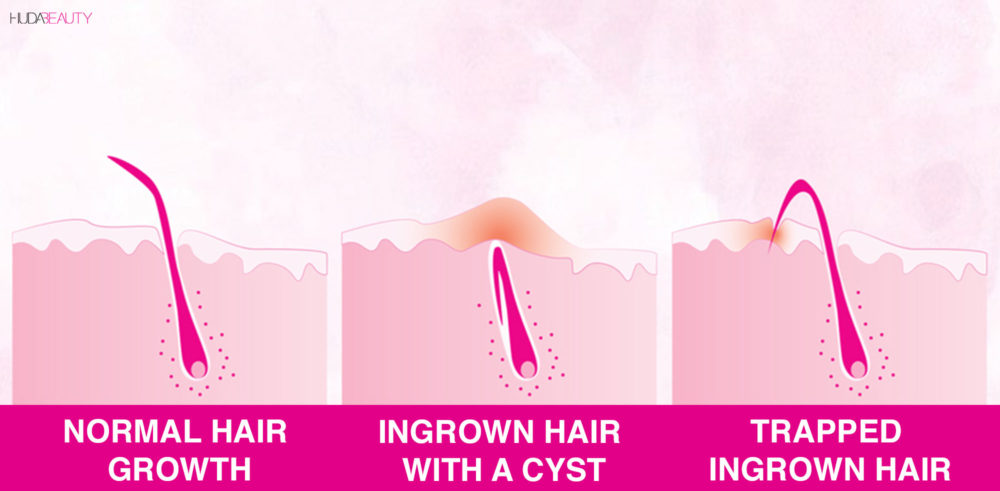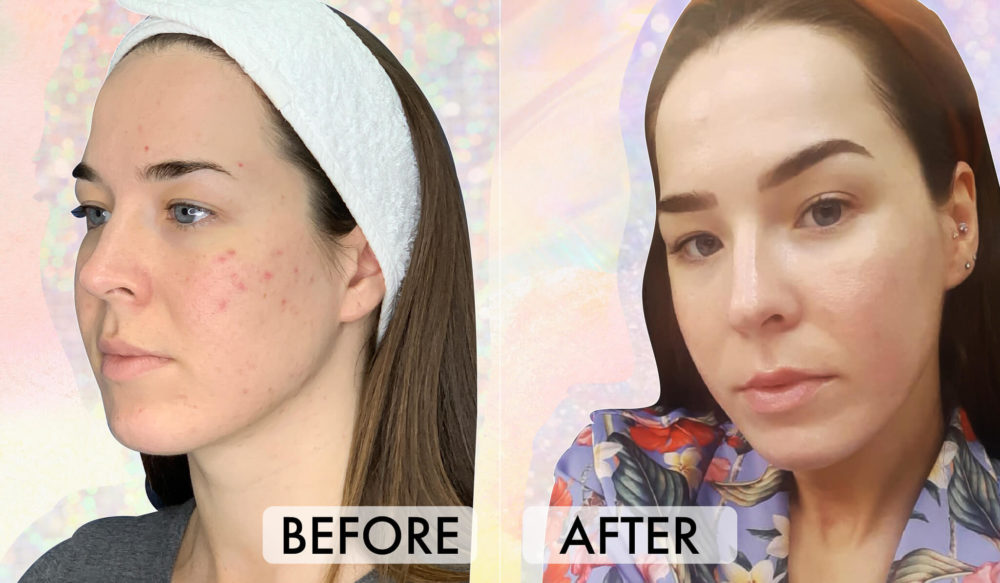How To Get Rid Of Ingrown Hairs & The Scars They Leave Behind
 via Giphy
via Giphy
Anyone who shaves or waxes regularly knows the continual struggle of ingrown hairs. There’s nothing more infuriating than when you’ve gone through the effort to get goddess-level soft skin, and then an ingrown hair pops up. Plus, sometimes they can be kinda painful, and if you remove them incorrectly, it can often lead to scarring. To help you banish ingrown hairs and avoid scarring once and for all, we spoke to celeb dermatologist and Founder of Lancer Skincare, Dr. Lancer, as well as NY-based dermatologist and Founder of Derma Di Colore, Dr. Carlos Charles, for their top tips. Here’s everything you need to know:
What Causes Ingrown Hairs?
Dr. Lancer explains, “Ingrown hairs are caused by irritation of the hair follicle. Wherever you injure a hair or carry out any sort of hair removal process (shaving, waxing or electrolysis), it can grow back at a different angle and get caught under the skin. Ingrown hairs can happen wherever there’s hair; it’s not just the bikini line; it could be the armpit, ear, nose, even eyelashes. For instance, with false eyelashes, when they’re removed, sometimes it’ll pluck a lash out, and the eyelash grows in ingrown.”
“Ingrown hairs occur more often in people with thick, dense hair. From simply an anatomic point of view, ingrown hairs occur when the hair is trapped partially or completely within the skin, leading to inflammation and sometimes localized infection. They can sometimes occur simply because of the physical anatomy of the hair or as a result of hair removal methods that completely remove the hair from the base,” says Dr. Charles.

How to Get Rid of Ingrown Hairs
“There are several approaches to treating ingrown hairs, depending on the state of the hair. For inflamed or infected ingrown hairs, certain topical treatments can be helpful such as antibiotics and gentle anti-inflammatory medications to calm the activity,” explains Dr. Charles. Try applying the Eucerin Skin Calming Creme, $23, to soothe the skin.
Dr. Lancer recommends going to see the dermatologist for a clinical removal. However, we realize that you guys won’t be able to run to the derm every time you get an ingrown hair. In which case, you should follow our step-by-step removal guide:
Step 1: Apply a warm washcloth to the affected area to soften the skin and open up the pore.
Step 2: Gently exfoliate using a chemical exfoliator. This will help remove any dead skin that’s clogging your pores and trapping the hair follicle. The Shobha Ingrown Relief Lotion, $22, is great. It features glycolic acid (an AHA) to exfoliate, chamomile to soothe, and glycerin to moisturize, which will help prevent future bumps from forming. The Bliss Ingrown Hair Eliminating Peeling Pads, $22, contains salicylic and glycolic acid to remove any dead skin debris and excess oil that’s congesting the pore.
Step 3: Apply a drop of tea tree oil to nourish and soften the skin. Tea tree is also anti-inflammatory and antibacterial, so it’ll reduce swelling and help battle bacteria in the skin.
Step 4: If a hair is exposed, use a sterile pair of tweezers to extract it. Pluck the hair using a smooth, swift motion. If it’s buried deep within the skin, do not pull it out! Wait until the hair appears, and then try to remove it.
Never Squeeze an Ingrown Hair…
We know it may be tempting to squeeze out your ingrown hair, but trust us, just don’t. When it looks like a tiny pimple, the ingrown hair has developed a keratin sac underneath the skin, which is a thick, yellow substance. Popping the cyst will not eliminate it, but it can spread the bacteria and worsen the infection.
How to Prevent Ingrown Hairs?
“There are several methods to help prevent ingrown hairs,” says Dr. Charles. “One easy approach is with gentle exfoliation, which helps the hair to grow in the correct direction. Additionally, proper shaving and hair removal techniques that do not completely remove the hair at the base [aka trimming] can minimize ingrown hairs.”
Dr. Lancer agrees, “Either don’t get a close shave (stubble), or permanently remove the hair with laser hair removal.” Dr. Lancer considers “Laser hair removal [to be] an investment in time and money as no matter what the shaving cream or blade if you’re prone to ingrown hairs, there isn’t anything you can use reliably to prevent them.”
Posts You'll Love:
Shaving Tips to Prevent Ingrown Hairs
 via Giphy
via Giphy
While Dr. Lancer advocates for laser hair removal, if you prefer to shave, make sure you read these top tips to help prevent shaving rash and ingrown hairs.
Find a good razor: A good quality razor is key to avoiding shaving rashes and ingrown hairs. Look for a razor with four or more blades, as this will reduce the likelihood of breaking the skin. Razors with maneuverable heads are great as they’ll move and adjust to the body’s shape, which is perfect for those trickier areas like your knees or ankles.
Always exfoliate first: Exfoliating before you shave will help remove any dead skin that’s clogging your pores and lying on top of your skin, enabling you to achieve a closer shave without irritation.
Finish with a blast of cold water: At the end of your shave (if you can handle icy temperatures), rinse your skin with a shot of cold water. This will close the pore, lowering the risk of irritation. Check out this post for more shaving tips.
Posts You'll Love:
If You Continue to Get Ingrown Hairs…
Dr. Charles agrees with Dr. Lancer and says that if you’re prone to ingrown hairs, “Laser hair removal can sometimes be curative for persistent problems with ingrown hairs. By minimizing the overall hair density with laser-based procedures, many of the problems associated with ingrown hairs resolve, and subsequently any skin-related problems resolve as well.” We can attest to the efficacy of laser hair removal for getting rid of ingrown hairs – it almost completely eliminates the problem.
How to Get Rid of Scars from Ingrown Hairs
Getting rid of scars from ingrown hairs takes a lot of patience, but we promise it’s possible – take it from the person who once had so many scars on their legs that people would ask what had happened: mosquito bites? “nope, I stupidly squeezed all my ingrown hairs!” #truestory!
Here are the two most important steps for getting rid of ingrown hairs.
Wear SPF: If the scars are on your legs or any area that’s exposed to the sun, the number one rule – and we cannot stress this enough – is to wear SPF 50. No scar will ever fade if it is constantly exposed to the sun, as UV rays only cause more pigmentation. We can vouch for the importance of SPF: we used to slather on oil after oil with little results because we were constantly (every weekend) going in the sun without applying SPF. It wasn’t until we protected our skin with a good SPF that we saw real results from the following steps that we took to fade our scars. Check out our fave protective sunscreens here.
Use Oil: Using a nourishing oil has given the most effective results for getting rid of scars from ingrown hairs. One of our fave tried and tested products is Bio-Oil, $7, which is specifically formulated to improve scars’ appearance and packs a unique blend of plant extracts and vitamins suspended in an oil base. If you can’t get your hands on Bio-Oil, another super effective oil we tried is vitamin E. If you can’t find pure vitamin E oil, you can buy liquid vitamin E capsules and use the thick oil to rub into the scars. Fortunately, you can buy pure vitamin E oil, $10 (look for a high IU, ideally above 20,000, for quicker results), making the whole process much easier.
The rule with oil is to make sure you spend time rubbing it in. If you can apply an oil (carrot seed oil and seabuckthorn seed oil are also very healing) at least twice a day, you will see results within weeks – with SPF, of course. If you have ingrown hairs on your bikini line, be sure to keep the oils away from your most intimate area to avoid irritation.
If you vibe with the less is more approach when it comes to hair down there, check out our DIY Brazilian wax guide. Or, if you love the all-natural vibe, check out these celebs who feel the same way.























Leave a comment